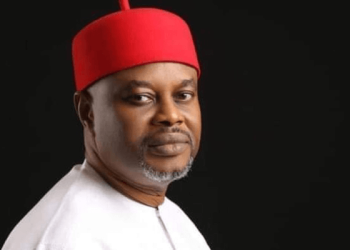Registered companies may have to underwrite the cost of providing security in the country, going by a bill currently before the Senate. If passed into law, each company will cough up five per cent of its annual profit as tax. Given the other taxes and levies they pay, and the increasing challenges of operating a business in Nigeria, the proposed tax is not only ill-conceived but also overkill that should be shelved.
The bill, which seeks to create additional funding for five security agencies, will invariably enlarge bureaucracy in the setting up of the National Security Tax Board to manage it, against the backdrop of the Federal Government’s desire to merge some agencies in line with the Steve Oronsaye report.
Besides, its use of rule of thumb to share the accruable funds: 35 per cent for the police; Department of State Services, 15 per cent; Nigerian Security and Civil Defence Corps, 15 per cent; Nigerian Prisons, 25 per cent and Fire Service, 10 per cent, is not in accord with the new zero budgeting system, which places emphasis on need and collectivisation of the treasury. The bill, entitled, National Security Tax Fund Bill 2015, passed through the First Reading early this month.
The Boko Haram insurgency in the North-East apart, armed robbery, kidnapping that spares nobody, irrespective of age, murder and rape have become a daily nightmare for Nigerians. Indeed, the state exists to deal with these challenges, as espoused in the constitution. As a result, security takes the lion’s share of the budget annually. Why this and the assistance of state governors in equipping or funding policing in the country have not helped, should be the concern of the Senate; and not creating a new tax for every national problem.
This calls for diligent parliamentary oversight insulated from graft, as it is done in other developed democracies. By doing so, corruption in security agencies that has undermined their operational efficiency will be checked. Its failure to discharge this duty effectively is why insecurity is on the rise. Many of the senators, including their presiding officers, were in the Seventh Senate and did nothing when the N19.7 billion, which the then Central Bank Governor, Lamido Sanusi, donated to the police to buy equipment, purportedly got lost in transit.
It was an embarrassing drama when the Public Accounts Committee of the House of Representatives, then chaired by Solomon Olamilekan, invited the Police Affairs Ministry that allegedly received the money, and the beneficiary – the police – to a meeting. Both denied the receipt of the fund even when the Accountant-General of the Federation confirmed its release from the treasury.
Some national challenges in the past had prompted the government to impose some taxes on companies, which include, but is not limited to the following: Education Tax, derived from two per cent on annual profit; Capital Gains Tax, a 10 per cent payment arising from sale of properties; Petroleum Profit Tax, requiring three per cent annual contributions to the Niger Delta Development Commission from oil companies; Stamp Duties; and Companies Income Tax.
Ironically, substantial amounts collected are not accounted for, nor utilised for the purposes for which they were created. This is the fate of the NDDC – an agency created to correct the infrastructural deficit in the oil-producing region. The magnitude of abuse of its funds is incredible. The Chairman of its board, Bassey Ewa-Henshaw, during a visit to Governor Adams Oshiomhole of Edo State in July, sought his assistance in the recovery of N800 billion due to it from the centre. But the most bizarre case was the N715 million allegedly spent on rituals by a former chairman, a few years ago.
Last September, the Revenue Mobilisation Allocation and Fiscal Commission wrote to 20 banks over their non-remittance of N12 billion, some of it tax revenues collected on behalf of the Federal Government, between 2008 and 2012. Since then, these banks have illegally sequestered this fund for their operations at the expense of public good.
But far more shocking was the N212 billion tax revenues the MDAs owed, or withheld as of 2012, which a former chairman of the Federal Inland Revenue Service, Ifueko Omogui-Okauru, decried. All this illustrates the fraud associated with tax collection and how it gravely undermines policy objectives. Therefore, what the country badly needs is a well-coordinated tax administration that will ensure the collection of existing taxes, debts owed in this regard, and accountability framework, and not new taxes.
Already, states in the throes of dwindling revenues, following the global decline of crude oil prices have imposed various levies and taxes on companies, which the Manufacturers Association of Nigeria regards as a disincentive to business. The Ikeja branch chairman of MAN, Oba Okojie, last year lamented that companies in Lagos State were encumbered with 10 taxes and levies.
Our business landscape is redolent with companies that have wound up because of the difficult operating environment. The premises of these firms have either been taken over by rodents, converted to warehouses, events management centres, or sold to religious organisations. In the 2016 Global Ease of Doing Business ranking released by the World Bank recently, the country was placed 169th out of 189 nations. This illiberal setting calls for a governmental stroke against those factors killing businesses, among them multiple taxes.
When oil companies, banks and the conglomerates that are the biggest taxpayers, are reeling from economic crises that stem from the fall in oil prices, high exchange rate and inflation, the Senate’s planned company security tax is, therefore, a non-starter and should be dropped.











































